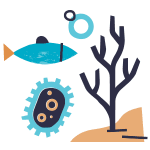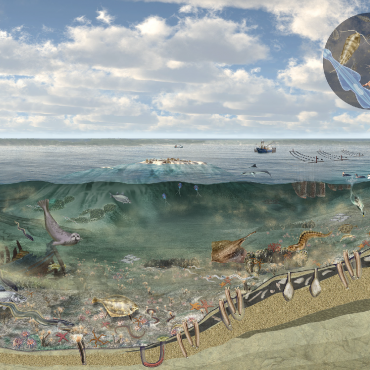Programme towards a rich Wadden Sea (PRW) is asked to seek and develop with others opportunities to improve the biodiversity and sustainable use of the (Dutch) Wadden Sea. PRW is also asked to identify possible changes on ecosystem level, and to challenge people and organizations to work towards a rich Wadden Sea from this holistic approach. With this in mind PRW saw that whales, when they get ashore, dead or alive, are threaten very specific. As long as they are alive the interest of the society is about rescuing the individual life. The Dutch government has now a very strict regulation how to deal with that. And when, sadly enough, a whale died in the shallow water or on shore, it has to be threatened as garbage, waste, because it gives nuisance to the local society. PRW started the initiative ‘whale carcass for nature and awareness’ in 2018. After a phase of pre-preparation in March 2020 the board of PRW decided to let a project group of Rijkswaterstaat, the Waddenunit/Ministery of Agriculture, Nature and Food quality and PRW itself work out the details of the proposed pilot project. On the 2nd of June 2021 the board decided, with the presented details, not to proceed with this pilot project now.
The idea of the pilot project
The aim of the pilot project was and is to learn from ecosystem perspective more about the importance of big carcasses and its decomposition for marine biodiversity interactions. And to raise awareness about the fact that dead and decomposition are normal parts of a sound ecosystem, and have added value to the understanding of the Outstanding Universal Values of the Wadden Sea World Heritage.
We have already some large marine mammal carcasses on shore (litoral), e.g. on Juist (2012) and on Rottumerplaat (2020, see www.basismonitoringwaddenzee.nl). The extra challenge of this pilot project was to arrange a subtidal situation. Not every sublittoral situation is suitable. And the chance that a large marine mammal carcass will get to a place which is not in conflict with human interests is very small. So part of the pilot project proposal is/was to bring a suitable carcass to a suitable spot.
The aim of the pilot was to learn from this scientifically and to contribute, via education and information, to raising awareness of the marine nature of the Wadden Sea and the significance of decomposition. PRW has investigated with the partners the choice of location for the pilot project, the aspects of transport and fixation, aspects of sonosis and food safety, and an approach to get the scientific research and monitoring and an education programme organized. You can read more about this investigation in the (Dutch) report “Pilot Walviskadaver voor natuur en bewustwording” and its attachments.
No further action
The analysis shows that it is possible to start a sublittoral pilot whale cadaver for nature and awareness – whereby the cadaver is kept under water. It is technically and financially possible. There is a suitable location (De Sprutel to the south of Isle of Schiermonnikoog) that is also suitable from a safety and support perspective. And there is at least one alternative location. For science, the pilot project offers an excellent opportunity to gain new insights into various fields, such as ecology, food safety and socio-economics (in situ research that ties in with current knowledge programs like Wadden Mosaic and Swimway). The pilot project adds a new element to the education programme about the Wadden Sea World Heritage Site and will appeal to the imagination of visitors. And the pilot offers opportunities for the deployment of targeted research capacity and innovation.
So why is the decision not to continue the pilot? For the board members there are still too many uncertainties, especially when it comes to who is responsible for the pilot and how the research and education programs will be organized and financed in detail. This demands extra steps, for which a provisional decision is necessary. The board decided that, also in relationship to other actual developments in the Dutch Wadden Sea region, taking this next step is not of the most importance now. The perceived practical objections and the matters that now require attention in the Wadden Sea, such as nature restoration measures and spatial interventions, meant that the board members did not want to continue with the pilot project Whale carcass in the Wadden Sea.
Thinking about
Although this pilot did not exceed into concrete measures in the Wadden Sea a part of the proposed outcome has been reached. Especially after the announcement in the regional media of the pilot proposal, March 2020, the debate about the importance of dead animals in the Wadden Sea ecosystem became more noticeable. An important outcome of the initiative is that the thinking about death and decomposition of large marine mammals in the ecosystem of the Wadden Sea (and the North Sea coastal zone) has changed. Because the subject is so sensitive, while thinking about the pilot idea and the operational elaboration, we worked step by step to get the conversation going. And this created mental space, when the opportunity arose in November 2020, to leave a washed-up dwarf minke whale at Rottumerplaat and start monitoring it (see www.basismonitoringwaddenzee.nl). In January 2021, a sperm whale washed ashore on Vlieland. A situation out of line with the guidelines, and in no way a candidate for the pilot project. But it became clear that the general public also had opinions about ‘just leave it’ and ‘it’s part of nature’.
Information available
All relevant information that has been gathered for the above elaboration is now available on the PRW website.(mostly Dutch). For questions and comments, please contact Michiel Firet. E m.firet@staatsbosbeheer.nl T +31 (0)6 12 96 18 98.


